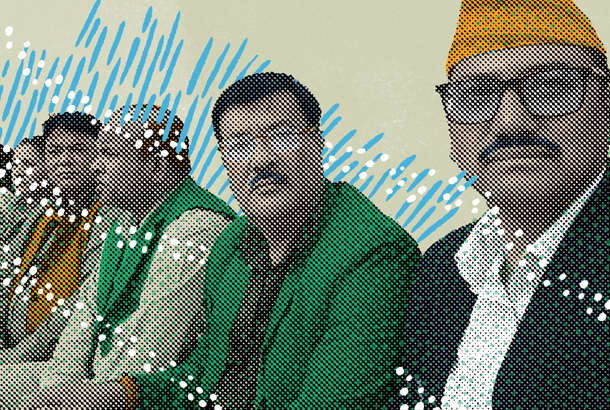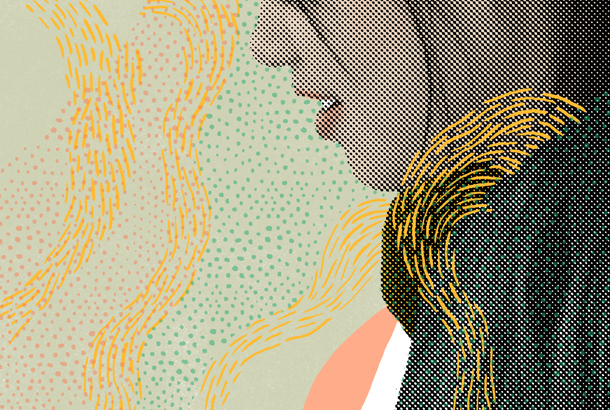Profiles from Asian Countries
Survivors and practitioners
Fighting for Equality, and against the Caste System
Nepal National Dalit Social Welfare Organization (Nepal)
Trilok Chand Vishwas, President (illustration by Vérane Cottin, photograph by NNDSWO)
Even though she was highly educated, Babita Paswan was limited to day labour after her husband died. In her small village in the south of Nepal, at the border with India, widows are perceived as inauspicious. On top of this, she was a Dalit woman, a caste already discriminated against. Ultimately she forced herself to stay in her house, unable to endure the prejudice for being both a Dalit woman and a widow. “I was so scared that people would talk behind my back that I decided to stay within my house as much as possible.” says Paswan. “I felt helpless and voiceless.”
In 1963, caste-based discrimination was abolished in Nepal and the National Dalit Commission was formed. However, according to the United Nations Committee on the Elimination of Racial Discrimination, segregation persists in practice, preventing marginalized castes, including Dalits, from safely marrying members of other castes, and from accessing places of worship, public spaces, public sources of food and water, educational facilities and housing facilities occupied by members of other castes. The United Nations Special Rapporteur on violence against women and girls noted in particular the high rates of early and forced marriages, disproportionately impacting Dalit girls.
"Still now there are so many incidents and problems in the society that Dalit people are facing,” said Trilok Chand Vishwas, national President of the Nepal National Dalit Social Welfare Organization (NNDSWO). He recalls that during his childhood Dalits were not allowed to drink from the public water taps used by the so-called upper castes. They always stood on the outskirts of public celebrations and festivals and could not enter the home of a member of another caste. “Dalits are not treated as human beings or equal citizens,” an issue he endeavored to address when he joined NNDSWO after graduating.
Education, Then Representation
NNDSWO focuses on the political participation of Dalits, conducting citizenship and voting drives. It acts as the interface between citizens and elected officials and puts forth candidates for local governments. NNDSWO plays a key role in advancing Dalits economically, through programs providing empowerment, legal literacy and skill training, as well as small business loans and networking opportunities. It has also implemented a series of environmental interventions for improving water, sanitation, and hygiene for all communities.
This work has allowed NNDSWO to prevent discriminatory incidents and, with funding from the United Nations Voluntary Fund on Contemporary Forms of Slavery, even reverse the circumstances for people like Babita Paswan. “I was stigmatized as I was both a widow and a Dalit woman, but joining the Human Rights Advocacy Alliance helped me learn about my rights and regain confidence.”
With the help of NNDSWO, Paswan began to participate in communal activities and social gatherings. She became a member of several human rights organizations and began to educate others about laws against caste-based discrimination, enshrined in Nepal's Constitution. Soon Paswan had a job as an office assistant in the rural municipality, and enjoyed economic stability and an improved social standing.
Nepal National Dalit Social Welfare Organization (NNDSWO) received its first grant from the United Nations Voluntary Fund on Contemporary Forms of Slavery in 2015.
“I didn’t feel human”
Pacific Links Foundation (Vietnam)
Photos may or may not depict ‘Mo’ but have been provided by the grantee organization. Credit: © Pacific Links Foundation, illustration by Vérane Cottin
Mo* is from the Lai Chau Province of Vietnam. When she was just 13 years old, she and her older sister were tricked into believing that they were being offered work in China. Instead, they were trafficked and sold into slavery.
Separated from her sister and unable to speak Chinese, Mo was eventually sold to a family. Still a child, she was forced to marry a man aged 20 who threatened to break her legs if she tried to run away. The family never gave her money to support herself. “It was a dark, scary time. I didn’t feel human. I was falling into a deep hole, not able to get out,“ shares Mo. She started learning Chinese and persuaded the family to allow her to work in a backpack production factory.
With the little money she was earning, Mo bought a mobile phone and called the Chinese police. Officers escorted her to the Vietnamese Embassy, who helped her return home. Mo was reunited with her mother, but her neighbors stigmatized her, and she became a social outcast. She didn't dare to speak to outsiders. She had also discovered that her sister had been forced to marry a Chinese man, and now had a young child.
"There were times when I went to work in the fields and was tired,” she said. “I looked down at the ground and said to myself, 'I can't live like this. My whole life is like this. I was criticized by people who didn't like me. I have to change.” At that point, Mo turned to the ‘Compassion House’ in Lao Cai, a safe house run by the Pacific Links Foundation.
A life transformed
As Mo herself says: "My life is very good right now. I am beyond what happened to me, I don’t look back. If it wasn’t for the Compassion House, I wouldn't be sitting here to tell my story." She learned necessary skills, including social skills. She was treated like family by the others. She initially studied tailoring, but afterwards applied for a culinary vocational training program in Hanoi.
With support from the United Nations Voluntary Trust Fund on Contemporary Forms of Slavery, Pacific Links Foundation was able to provide holistic assistance to many young girls and women who survived contemporary forms of slavery, like Mo.
Pacific Links Foundation provides comprehensive reintegration services to empower trafficking survivors with the self-confidence and self-reliance to reduce re-trafficking risks and establish a foundation for a safer future. “We nurture trafficking survivors’ self-confidence and skill sets to build new lives,” saysDiep Vuong, President of Pacific Links Foundation.
Pacific Links Foundation received its first grant from the United Nations Voluntary Trust Fund on Contemporary Forms of Slavery in 2016.
Breaking the Cycle of Bonded Labor
Association of Network for Community Empowerment (ANCE) (Pakistan)
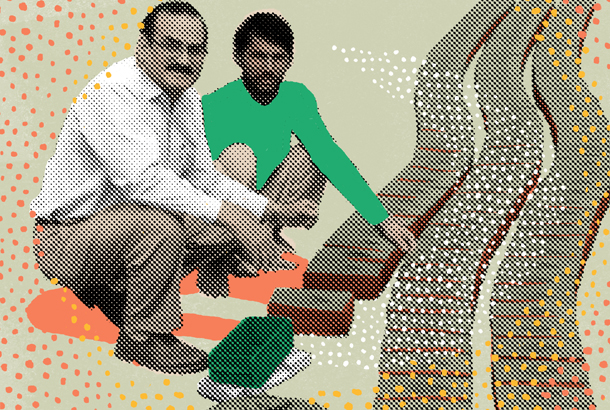
Muhammad Yousaf (illustration by Vérane Cottin, photograph by ANCE)
Muhammad Yousaf is a 49-year-old brick kiln worker in Pakistan. For many years, he earned less than 35 USD a month to support his family of seven children. It was even harder to meet his family's basic needs when his daughter fell ill. The family decided to cut spending on food to pay for her treatment, but this was not enough.
To pay for these unexpected expenses, Muhammad would have to take out a loan, an advance of wages, from his employer, called Peshgi. In practice, Peshgi debt is impossible to pay back; workers are trapped working for their employers forever. If Muhammed became ill or died, the debt would pass down to his children, who would be forced to start working.
The Association of Network for Community Empowerment (ANCE) helped Muhammad obtain his Pakistan Employees Social Security Institution (PESSI) cards, enabling workers to access free medical treatment. As a result, his daughter was treated at the Nawaz Sharif Hospital, Lahore, free of charge, and his wife who suffered from hepatitis as well.
“I am happy that my whole family is now medically covered, and I do not have to borrow for medical treatment anymore,” said Muhammad.
Rights for Brick Kiln Workers and their Children
According to the United Nations Human Rights Committee, bonded labour practices persist in Pakistan, especially among specific castes such as the Dalits, and particularly in the brick kiln industry, where victims are “engaged in labour under hazardous and slavery-like conditions.” The United Nations Committee on the Elimination of Racial Discrimination highlights that brick kiln workers often lack other means of making a living, pushing them into a cycle of debt bondage. Widespread impunity protects perpetrators and helps perpetuate this exploitative system, which targets both adults and a large number of children.
ANCE’s founder, Raja Abbas Ali, was forced to start working as a child. “My childhood experience when I used to work on the lathe machine has left a deep imprint on my life,” he recalls. “I can never forget the incident where I lost [25 Pakistani Rupees] of my ustad on my way back from the vegetable market. He fined me 2 Rupees every week until he recovered the money. And 2 Rupees per week was all I got at the time. […] I hate that time now, as I hated it then.” Abba Ali went on to establish ANCE to help ensure children could receive education and avoid bonded labour.
With assistance from the United Nations Voluntary Trust Fund on Contemporary Forms of Slavery, ANCE is able to meet with workers and their children to make them aware of their rights. It ensures the children of brick kiln workers obtain birth certificates, enabling them to access education.
ANCE also works to obtain national identity cards for the workers, giving them a claim to basic human rights and enabling them to travel to other cities. ANCE also enables workers to obtain PESSI cards as it did for Muhammad. By doing this, ANCE helps individuals to break the cycle of bonded labour.
Association of Network for Community Empowerment received its first grant from the United Nations Voluntary Trust Fund on Contemporary Forms of Slavery in 2002.
Tackling the Pandemic Disproportionate Effects on the Vulnerable Jan Sahas Social Development Society (India)
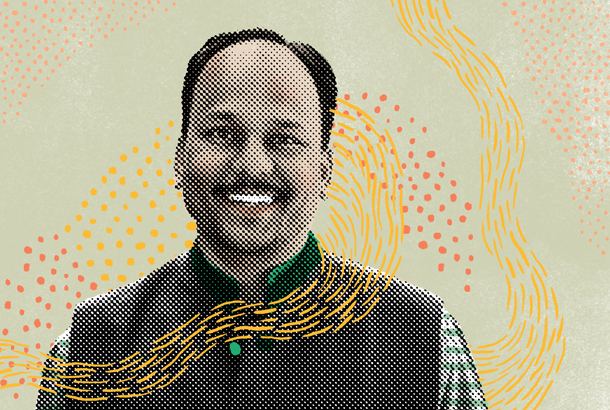
Ashif Shaikh, Founder and Chief Executive Officer (illustration by Vérane Cottin, photograph by Jan Sahas Social Development Society)
Following the announcement of the lockdown in India in mid 2020 to limit the spread of COVID-19, many impoverished migrants were left without work and unable to pay for rent and food. As these workers turned around and began the long journey home – often on foot – they were facing a worsening health and hunger crisis.
During the months ahead, the numbers of infections and deaths skyrocketed and the immediate needs were acute. Having worked with excluded social groups in India for more than two decades, the organization Jan Sahas sprang into action. With financial support from the United Nations Voluntary Fund on Contemporary Forms of Slavery, it mounted a swift response that included dry rations to more than a million migrants, cash support, and mental and legal aid.
“The COVID-19 crisis has consistently been worse for vulnerable communities,” said Ashif Shaikh, the Jan Sahas Founder and Chief Executive Officer (CEO). “As the pandemic worsened, more people were forced to choose between safety and survival, which means they took far greater risks to find work.”
Aiding migrants and survivors of gender-based violence
Since 2000, Jan Sahas Social Development Society has assisted millions of migrants, Dalits and other deprived caste communities to ensure their safe passage in India and to bring them into the mainstream of its society. There are an estimated 139 million internal migrant workers in India who are forced to emigrate due to lack of livelihood opportunities at home. These workers and their families continually face the perennial problems of poor working conditions, long hours, lack of water, sanitation or safety equipment and forced labour, according to the International Labour Organization.
Ten years after the 2012 gang rape in which a group of men attacked a young woman named Jyoti Singh Pandey who later died from her injuries, the Indian government strengthened punishments for cases of sexual harassment and assault.
Yet, rape survivors in India face significant barriers to obtaining justice and critical support services. If the victims are migrants or from a lower caste, police may choose not to even register their sexual assault; there are multiple cases where the police pressured women to settle their complaints for money, a Jan Sahas report found.
In addition to providing direct assistance to survivors, Jan Sahas engages with men and boys to bring about behavioural change. The organization also runs a toll-free helpline for girls and women where they can report any form of violence. The team then follows up with relevant authorities. To date, Jan Sahas has helped over 21 million survivors of sexual violence and have prevented over 7,000 women from trafficking and more than 6,000 young girls from caste based commercial sexual exploitation of children.
Jan Sahas Social Development Society received its first grant from the United Nations Voluntary Fund on Contemporary Forms of Slavery in 2011.
Supporting and Empowering Victims of Bride Kidnapping and Domestic Servitude in Rural Areas of Kyrgyzstan
NGO Aryyjan-Karakol (Kyrgyzstan)
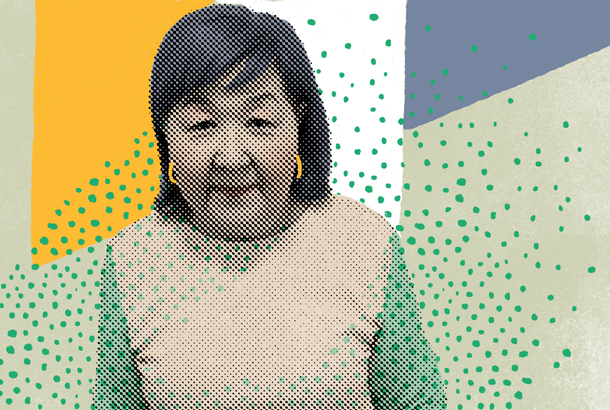
Nurgul, Director of the NGO Aryyjan-Karakol (illustration by Vérane Cottin, photograph by NGO Aryyjan-Karakol)
Gulaiym* was kidnapped at the age of 17 by a man from a nearby village. Her mother was told that Gulaiym had agreed to marry him, and gave her assent to the union. In reality, Gulaiym did not know the man who kidnapped her; she was told that her parents would not come to get her and that she had no other choice but to stay.
Soon after the wedding, Gulaiym’s husband left to work in Russia, leaving her with his parents and brother, who raped her twice in his absence. A year later, Gulaiym found out her husband had a second wife and family in Russia. Now pregnant, she escaped back to her parents’ house.
Like Gulaiym, many other Kyrgyz girls and women are forced into marriage - a traditional practice known as bride-kidnapping which persist despite being illegal. In 2022, the United Nations Committee on the Elimination of Discrimination against Women (CEDAW) noted that the prevalence of non-consensual bride kidnapping remains high in Kyrgyzstan, especially in rural areas. It noted that the persistence of patriarchal attitudes and discriminatory stereotypes undermined Kyrgyz girls’ and women’s rights and increased their vulnerability to abuse, violence and exploitation.
Aryyjan-Karakol is a community-based organization run for women, by women. Created in 2011 in the Issyk-Kul region in Kyrgyzstan, it assists women victims of domestic servitude, bride kidnapping and forced and early marriage by providing shelter, as well as psychological, social and legal services and counselling.
Expanding Employment Opportunities for the Beneficiaries
Girls and women like Gulaiym are able to find a safe shelter, and receive free psychological consultations, vocational training, and support in finding affordable housing and employment opportunities thanks to the organization’s efforts. “I came to the organization in 2017 as a victim, where I received not only legal and psychological assistance, but grew professionally as well,” says Mayram, a former beneficiary and now social worker at Aryyjan-Karakol.
Through vocational training, such as sewing and baking classes, Aryyjan-Karakol aims to economically empower its beneficiaries. Women can start generating income directly at the shelter’s souvenir shop or bakery, or gain access to other employment opportunities thanks to the organization’s partnerships with local businesses and the regional administration. This helps women gain financial independence, enabling them to make their own decisions in life and significantly impacting their ability to break free from abuse and exploitation. “Now, I am a leader of a women’s council in my village, as well as a proud social worker of Aryyjan-Karakol”, shares Mayram.
With the support of the United Nations Voluntary Trust Fund on Contemporary Forms of Slavery, Aryyjan-Karakol has expanded its operations to annually assist more than a thousand victims of domestic servitude, bride kidnapping and forced and early marriage, and their family members, with vocational skills training and holistic care.
“Despite how challenging our work is, it is important for us to stay available to women who have faced any kind of abuse, I am proud of the work we are doing”, says Nurgul, Director of the organization. Thanks to the constant and ongoing support of the Fund, the organization has been able to grow and improve its services.
NGO Aryyjan-Karakol received its first grant from the United Nations Voluntary Trust Fund on Contemporary Forms of Slavery in 2017.
Bringing the plight of migrant workers to the fore
Kurdish Human Rights Watch (Iraq)
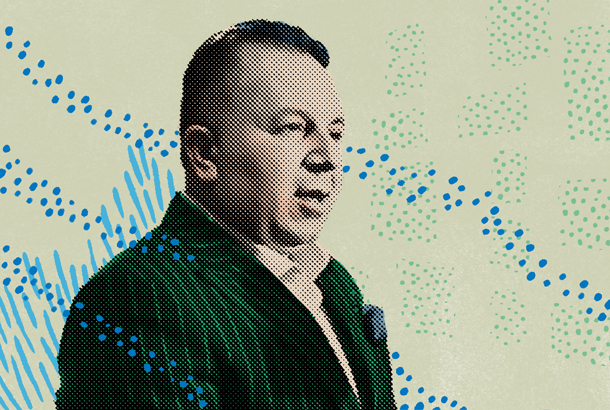
Hoshyar Malo, Executive Director (illustration by Vérane Cottin, photograph by Kurdistan Human Rights Watch)
When M.* left Bangladesh, he thought he could better his condition by working in Iraq, though he could not get an official residency permit to live and work there.
He started working long hours for a cleaning company in Erbil. Well aware of his precarious status, his employer refused to pay him, threatening to turn him in to the police. Overworked and exploited, M. felt trapped.
This situation continued until he met with a staff member of the Kurdish Human Rights Watch (KHRW) directly at his workplace during one of their field visits. He was informed about his rights and started a legal case against his employer.
Finding this unexpected support truly changed his situation at a moment where he felt he could only count on himself.
“We are forgotten by the government because of war, IDPs and refugee priorities,” said a group of migrant workers in one of the awareness sessions hosted by KHRW, echoing the sense of helplessness felt by M.
Legal redress and sustainable solutions at the Center
M.’s struggle is unfortunately not unique to Iraq. In 2022, the Human Rights Committee noted the “increasing incidence of internal and cross-border trafficking” in the country. In 2019, the United Nations Committee on the Elimination of Discrimination against Women (CDEAW) noted with concern that since 2003, up to 10,000 women and girls have been kidnapped or trafficked for purposes of sexual exploitation, or held for ransom in the country.
“The legal system in Iraq is unable to protect migrant labourers from contemporary forms of slavery,” according to Hoshyar Malo, KHRW’s Executive Director.
In that context, KHRW aims to provide legal assistance to migrant workers trapped in forced labour or commercial sexual exploitation. With the support of the United Nations Voluntary Trust Fund on Contemporary Forms of Slavery, the organization opened the Legal Defense Center, which provides legal awareness sessions, case management, legal consultation, and representation for up to 400 beneficiaries a year.
M. was one of them. With KHRW’s assistance, he was able to escape his employer’s control, and received a residency permit allowing him to stay in Kurdistan and move freely around Erbil. He is now looking for a new job.
Kurdish Human Rights Watch received its first grant from the United Nations Voluntary Trust Fund on Contemporary Forms of Slavery in 2017.
